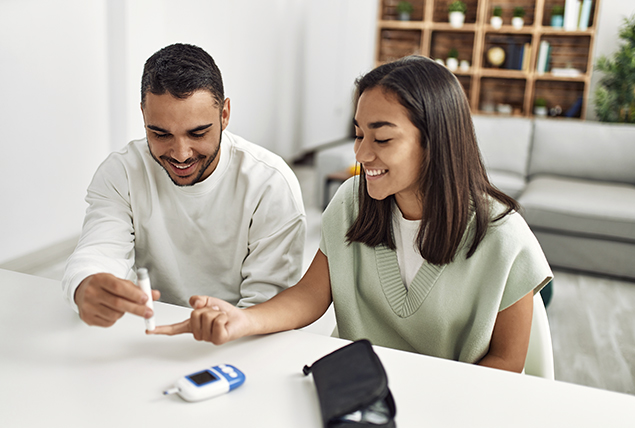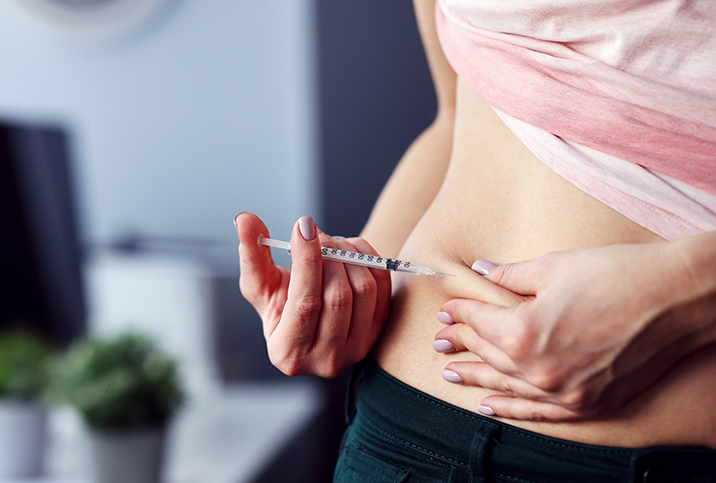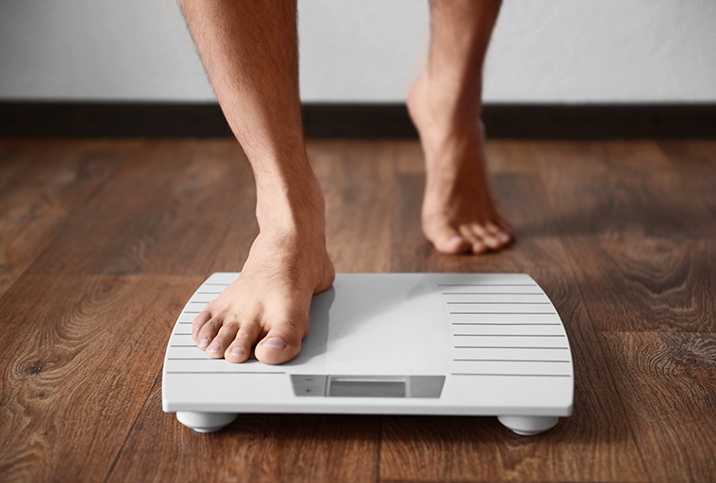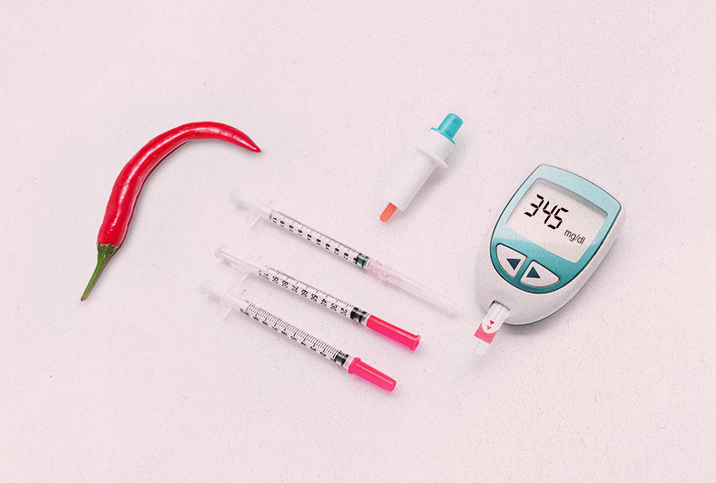The Many Ways to Live With and Manage Diabetes

Diabetes is a chronic disease that alters how your body processes sugar (glucose). The body converts a large portion of the food we eat into glucose for energy. Insulin, a hormone produced by the pancreas, facilitates the entry of glucose into cells, where it can be utilized for energy.
When a person develops diabetes, their body either produces insufficient insulin or uses it inefficiently, which leads to increased blood sugar levels.
Type 1 and type 2 diabetes are the two main types of diabetes. Type 1 diabetes is an autoimmune condition brought on when the insulin-producing cells in the pancreas are attacked by the immune system. To manage diabetes, people with type 1 have to take insulin to make up for what their bodies are no longer able to produce.
While type 1 diabetes usually develops during childhood or adolescence, type 2 diabetes usually develops gradually in adulthood.
Type 2 diabetes risk factors include a family history of the disease, obesity, inactivity and stress. Insulin is still produced by the pancreas, but the body has difficulty utilizing it. Cells become insulin-resistant, and the pancreas must work harder to maintain proper blood sugar levels.
Having diabetes can impact every aspect of a person's life, including sexual health. Over time, excessive blood sugar levels—hyperglycemia—can cause cardiovascular issues and nerve damage, which both have effects on sexual health.
Hyperglycemia's effects may interfere with a woman's capacity for arousal and stimulation during sexual activity. This could lead to vaginal dryness, which might make sex unpleasant and having an orgasm more challenging.
The main sexual health issue that affects men with diabetes is erectile dysfunction(ED), the persistent inability to achieve or maintain an erection sufficient enough for sex. For a man to achieve an erection, there must be blood flow to the penis. Diabetes damages the blood vessels and nerves, which can inhibit this process.
Men with diabetes often have low testosterone, which can lessen their desire for sex.
Living with diabetes
Many people with diabetes are able to live long, fulfilling and productive lives. It's just a matter of treating diabetes and keeping blood sugar levels under control.
"The good news is there are so many ways to treat diabetes these days, and it's so effective," said Marshall J. Bouldin, M.D., the chief medical officer, vice chairman and co-founder of Vigilant Health in Ridgeland, Mississippi. "There's just no reason to have diabetes out of control. If people get the proper support and time from their care system, there's no diabetes that can't be whipped."
Lifestyle modifications are the first step toward treating diabetes. A balanced diet and regular exercise can help people control their disease. If medications are needed, plenty of options exist, according to Bouldin.
Metformin, a relatively inexpensive pill, is typically the first medicine people with diabetes start taking. Insulins, which are used to treat type 1 diabetes and advanced type 2 diabetes, have improved as well. Bouldin said they've never been safer and more effective.
New hormone injections are amazing in what they can do for diabetes, he added.
"They're hormones that are natural that the body uses to control your glucose," he explained. "So when you take them, they reenable the broken natural systems. It gives you really safe sugar control, so you won't get low sugars from them. And you don't get adverse effects. They turn themselves off when your sugar goes into a normal range. What could be better than that, right?"
These natural hormones regulate weight and glucose control and have great effects on appetite and gastric emptying.
Diet and nutrition
The American Diabetes Association (ADA) does not recommend specific amounts of carbohydrates, fats or proteins to eat. However, it does recommend that people with diabetes get their carbohydrates from vegetables, fruits, whole grains and legumes. It's important to avoid foods that are high in saturated fat, sugar and sodium.
A healthy and balanced meal plan, along with an active lifestyle, can help you manage diabetes. Consider working with a dietitian to develop a meal plan you can follow consistently over time.
"Sensible eating is what diabetes is all about," Bouldin said. "Diet is not a religion in diabetes; it's just a diet. The normal human diet is the recommended diet. The thing is, our diet has gotten extremely hostile and abnormal."
For example, portion sizes have increased substantially.
"The normal human diet has green things on a plate, meat on a plate, carbohydrates on a plate, and they're all mixed up together and they're kind of in similar proportions," Bouldin said. "It's really all about portion control."
Bouldin tends to recommend low-carbohydrate diets because complex sugars are not a sensible thing to eat if your body can't metabolize them. Vegetables and proteins don't stress the system that produces insulin.
"I'm happy with any diabetic who will eat a normal human diet and stop overeating," he said.
Dating with diabetes
If you are dating while living with diabetes, there's no one-size-fits-all answer for when you should tell a potential partner you have the chronic disease. It's important that you have the conversation, though; just do it whenever it feels natural and comfortable to you.
Consider letting them know when it becomes relevant or when you are ready to share more intimate details about yourself. This may be after several dates. You may want to bring up diabetes at the beginning of a conversation. That way, the prior discussion does not influence what you intend to say or lead you to hesitate.
Be open and honest about how diabetes affects your life, but you do not need to go into painstaking detail. Make the conversation more of a dialogue, allowing your date to ask questions if they have any.
Dating while living with diabetes requires some planning. If you're going on a lunch date, for example, check the restaurant's menu before you go so you can select a meal that makes sense for your diabetes management.
If you are at risk for hypoglycemia (low blood sugar), make sure you bring emergency glucose. Having a backup of insulin, pump supplies and test strips is also important.
Talk to your partner
Talking to your partner about your diabetes is critical. Not conversing about the disease and the emotions it brings does not do the relationship any good. Discuss the condition and all it implies. Share your worries and concerns openly.
For example, if you are concerned about the impact of dietary restrictions on your and your partner's social life, talk about it. Don't let guilt get in the way.
The better you understand your diabetes, the better you and your partner can manage it. Both of you should learn about the health risks of high blood sugar levels, the benefits of exercise and the best diet to keep your diabetes under control. You may want to take your partner along to your medical appointments.
Always talk openly and clearly about how to work together so you're as healthy as you can be. Don't assume your partner will feel burdened by tasks related to your diabetes management—but also don't expect them to be your caretaker.
Ask them how they would like to help in your diabetes management. Be honest about the level of support you'd like.
Prevention and aftercare
Prediabetes and type 2 diabetes are preventable. About 9 in 10 cases in the United States can be avoided by making lifestyle modifications.
The easiest, fastest and most reliable way to prevent diabetes is to lose weight, according to Bouldin, and for most people, that doesn't require medicine. Behavioral change is usually enough.
"You can prevent the onset of diabetes and you can reverse the diabetes you have. If you lose weight at any point in the disease of type 2 diabetes, you can decrease the number and dosage of medicines you're taking," he said. "You can come off insulin and go back to pills if you unweight and reverse the metabolic disadvantage at any stage of the disease. At any stage of the disease, if you'll stop gaining weight, you can stop the progression of insulin resistance."
Quitting smoking also helps. Smokers are about 50 percent more likely to develop diabetes than nonsmokers.
Drinking moderate amounts of alcohol—a drink a day for women and no more than two drinks a day for men—has been shown to increase the efficiency of insulin at getting glucose inside cells. Some research indicates that moderate alcohol consumption decreases the risk of type 2 diabetes.
Resources for patients and caregivers
Patients and caregivers may find the following resources helpful:
- National Family Caregivers Association
- Centers for Disease Control and Prevention (CDC)
- National Institute of Diabetes and Digestive and Kidney Diseases (NIDDK)
- American Diabetes Association
- Association of Diabetes Care & Education Specialists
- World Diabetes Foundation
- Joslin Diabetes Center
- Academy of Nutrition and Dietetics


















